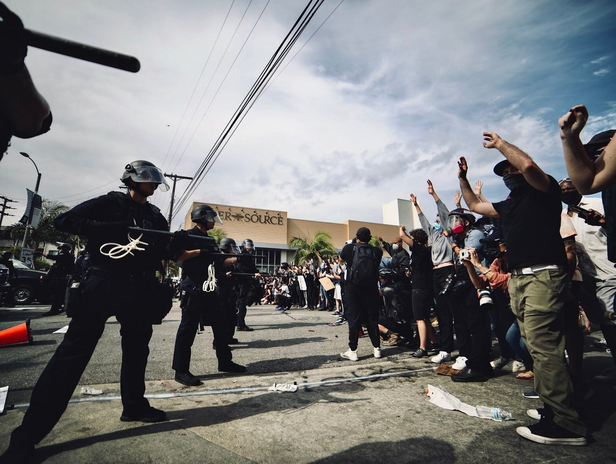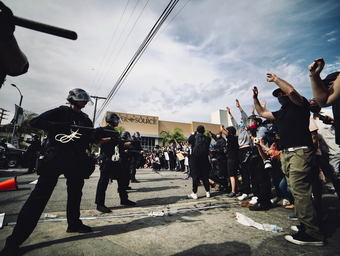In December last year, India passed the controversial Citizenship Amendment Act, resulting in nationwide outrage and protests due to its Anti-Muslim nature. Around a week ago, a video capturing the brutal murder of a black man by a police officer in Minneapolis began circulating on social media, leading to protests all over the United States of America. From police brutality to abortion laws, from religious persecution to labour laws, protests arise where inequality and injustice prevail. As the world progresses, it would seem only natural for humanity too as well, but the reality of the situation is starkly different. The privileged only get wealthier and safer while the rights of the oppressed seem to be weakening. Democratic governments that have been built on the foundation of its people have begun to become far more tyrannical and discriminatory as the years have gone by, resorting to unethical means of controlling their citizens, trying to avoid any form of rebellion.
While the Indian government has so far stuck firmly by the CAA, defending it by claiming that people have misunderstood its implications and it isn’t discriminatory after all (suuuure), there have been several instances in the past where protests have forced an outcome of change. There is no doubt about the fact that Derek Chauvin (the man who killed George Floyd) would still be roaming free had America chosen to not feel enraged and step out to the streets, even in the midst of a pandemic. Similarly, the angry reaction of Indians after the Nirbhaya case pushed for stricter rape laws and faster action. Often, protesting may seem endless and futile, but it is a minuscule effort to make for a larger change. In case you’ve been feeling fatigued and questioning whether your voice and dissent is worth it, here are 9 instances of protests successfully bringing about revolution:
1. The Women’s Suffrage Movement- The Women’s Suffrage refers to the right of women to vote in elections. The movement first began in 1848 when women working towards social reforms realized that without the right to vote, they would be unable to bring about any formal change. Over the next 72 years, under the leadership of women like Susan B. Anthony, Elizabeth Cady Stanton, Carrie Chapman Catt, and Alice Paul, the movement grew immensely and spread worldwide, and in 1920 American women were granted the right to vote.
2. The Dandi March– On April 5th 1930, Mahatma Gandhi reached Dandi, a coastal village in Gujarat. Having left his home almost a month prior with only 78 followers, by the time Gandhi reached Dandi he was leading a crowd of tens of thousands of followers. The march was an act of defiance against the British Salt Tax, which prevented Indians from collecting or selling salt, resulting in them having to buy salt from the British who charged a hefty tax. Nearly 60,000 people were arrested, including Gandhi, but the Dandi March paved the way for mass protests across the country, and Gandhi’s non-violent movement eventually led to Indian Independence in 1947.
3. The Montgomery Bus Boycott– On December 1st, 1955, Rosa Parks, a black seamstress was asked to give up her seat on a bus in Montgomery for a white man. Her refusal to do so led to her arrest, a fine of 10$, and the Montgomery Bus Boycott- a civil rights protest against racial segregation on public transport systems. African Americans in Montgomery refused to ride buses for over a year until the court finally passed a ruling declaring racial segregation in buses as unconstitutional.
4. Stonewall Riots– Stonewall Inn is an LGBTQ bar in New York that was raided by police forces in June 1969 leading to six days of subsequent riots. 1960s America wasn’t a queer-friendly era and gay clubs would provide refuge to a community being shunned by society. The Stonewall Riots are considered to be the spark that ignited the gay rights movement in not just America but the world.
5. The Monday Demonstrations– Starting on 4th September 1989, the Monday Demonstrations were a series of peaceful protests in East Germany, pushing for the fall of the Berlin Wall. The movement gathered hundreds of thousands of supporters and led to the fall of the Wall on 9th November and then the official reunification of Germany about a year later in October.
6. The Orange Revolution– In 2004, Viktor Yanukovych was declared as the winner of the presidential election in Ukraine, beating the opposition leader, Yushchenko. Hundreds of thousands of Ukrainians gathered into the streets of Kyiv to protest the declaration that Yanukovich had won, accusing the elections of being tainted by fraud and corruption. Yushchenko’s campaign colour, orange, was adorned by demonstrators, thus labelling the protests as the Orange Revolution. The Supreme Court ultimately called for a revote and the results were reversed, with Yushchenko becoming President instead.
7. The Jasmine Revolution– The Arab Spring began with the Jasmine Revolution- in December 2010, Mohammed Bouazizi, a vegetable vendor lit himself on fire after being harassed by a policewoman for not having a permit to sell his produce. Bouazizi was infuriated by Tunisia’s poor working conditions and people related to his anger. They were tired of President Zine El Abidine Ben Ali’s corruption and staged mass protests in Tunis, forcing Ben Ali to abdicate his position and flee to Saudi Arabia.
8. Puerto Rico’s Summer Rebellion– In 2019, misogynistic and homophobic text messages from a group chat between Governor Ricardo Rossello and 11 of his cabinet ministers were leaked. The texts included jokes about Hurricane Maria victims, homophobic comments about singer Ricky Martin’s sexuality, and sexist remarks mocking women, among other vile statements. After two weeks of mass protests by hundreds of thousands of people on the island, Rossello finally resigned.
9. 2019 Hong Kong Anti-Extradition Bill Protests– In April 2019, Hong Kong introduced an Extradition Bill that would allow criminal suspects to be extradited to Mainland China. This caused tensions to rise as Hongkongers were concerned that they would not receive a fair trial in China and would be subjected to state violence. Hundreds of thousands of people protested for several months until the bill was finally withdrawn. However, the protests continue today as protestors feel that it was “too little, too late” and the withdrawal of the bill is only one of their many demands.
Protesting is essential for the progression of any democratic society as it protects human rights, provides a platform to minority groups to voice their grievances, and there’s a chance it may result in actual change. It’s important to always take that chance when facing oppression because it’s worked in the past and it will again.


